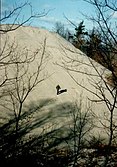Pictured left: The Indiana Dunes on Lake Michigan, which ecologist Henry Chandler Cowles referred to in his development of his theories of ecological succession.
In the History of ecology, ecology is generally spoken of as a new science, having only become prominent in the second half of the 20th century. More precisely, there is agreement that ecology emerged as a distinct discipline at the turn of the 20th century, and that it gained public prominence in the 1960s, due to widespread concern for the state of the environment. Nonetheless, ecological thinking at some level has been around for a long time, and the principles of ecology have developed gradually, closely intertwined with the development of other biological disciplines. Thus, one of the first ecologists may have been Aristotle or perhaps his student, Theophrastus, both of whom had interest in many species of animals. Theophrastus described interrelationships between animals and between animals and their environment as early as the 4th century BC.
While Charles Darwin focused exclusively on competition as a selective force, Eugen Warming devised a new discipline that took abiotic factors, that is drought, fire, salt, cold etc., as seriously as biotic factors in the assembly of biotic communities. Biogeography before Warming was largely of descriptive nature – faunistic or floristic. Warming’s aim was, through the study of organism (plant) morphology and anatomy, i.e. adaptation, to explain why a species occurred under a certain set of environmental conditions. Moreover, the goal of the new discipline was to explain why species occupying similar habitats, experiencing similar hazards, would solve problems in similar ways, despite often being of widely different phylogenetic descent. Based on his personal observations in Brazilian cerrado, in Denmark, Norwegian Finnmark and Greenland, Warming gave the first university course in ecological plant geography. Based on his lectures, he wrote the book ‘Plantesamfund’, which was immediate translated to German, Polish and Russian, later to English as ‘Oecology of Plants’. Through its German edition, the book had immense effect on British and North American scientist like Arthur Tansley, Henry Chandler Cowles and Frederic Clements. (Full article...)
